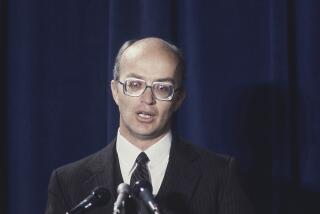Paper Says Meese Aides Were Told to Avoid Wedtech
- Share via
WASHINGTON — Aides to Edwin Meese III were advised in 1981, when the attorney general was White House counselor, not to get involved in problems that Wedtech Corp. was having in getting a no-bid Army contract, a published report says.
The Washington Post, quoting informed sources, reported in today’s editions that the advice was contained in memos from former White House counsel Fred F. Fielding and former Cabinet secretary Craig L. Fuller.
The pair told Meese’s top aides that on ethical and procedural grounds, they should not be involved in the Wedtech case. However, one aide convened a White House meeting on the subject anyway.
Three Criminal Probes
Wedtech, a defense contractor in the Bronx, N.Y., is at the center of three federal criminal investigations into allegations that the firm paid off more than a dozen local, state and federal officials in return for favors.
In 1982, Meese acknowledged that as White House counselor he interceded on behalf of Wedtech and directed his staff to make sure that Wedtech received consideration from the Army in connection with a $28.2-million no-bid contract to supply engines to the government. The Army had objected that the price was too high. Wedtech eventually got a $32.2-million contract. Meese has said there was nothing unusual about his intercession.
Recently, it was disclosed that Meese’s financial adviser, who manages his blind trust, served on Wedtech’s board and may have invested some of Meese’s money in the company without Meese’s knowledge.
Meese at his own request was interviewed last week by the FBI about Wedtech, and he is regarded only as a witness, not a suspect, in the probes.
The Post said the memos from Fielding and Fuller have been turned over to independent counsel James C. McKay, who is investigating allegations that former White House political director Lyn Nofziger lobbied his former government colleagues on behalf of Wedtech within a year of leaving his post in violation of federal conflict-of-interest laws.
Sources told the newspaper that the first mention of Wedtech at the White House occurred in 1981, when Ed Thomas, then a deputy to Meese, asked Fuller’s office to look into problems Wedtech was having in seeking the Army contract. After Thomas left the White House in 1981, memos continued to Meese’s top deputy, James E. Jenkins, the Post said.
1982 Meeting
Sources said that despite the warnings Jenkins convened a meeting about Wedtech at the White House in May, 1982. Jenkins left the White House in May, 1984, and last year was hired by Wedtech as marketing director in Washington.
Fuller argued that the Wedtech contract was too small to come to White House attention, whereas Fielding was concerned about the appearances of “people coming in the White House and talking about contracts,” the Post said.
Justice Department spokesman Terry Eastland told the Post that Meese did not recall the memos or conversations about them.
More to Read
Inside the business of entertainment
The Wide Shot brings you news, analysis and insights on everything from streaming wars to production — and what it all means for the future.
You may occasionally receive promotional content from the Los Angeles Times.










